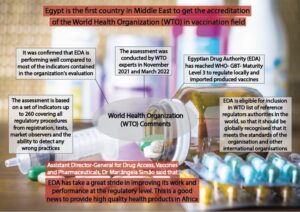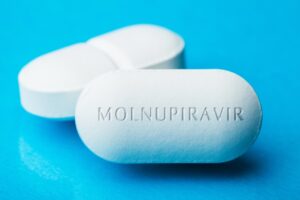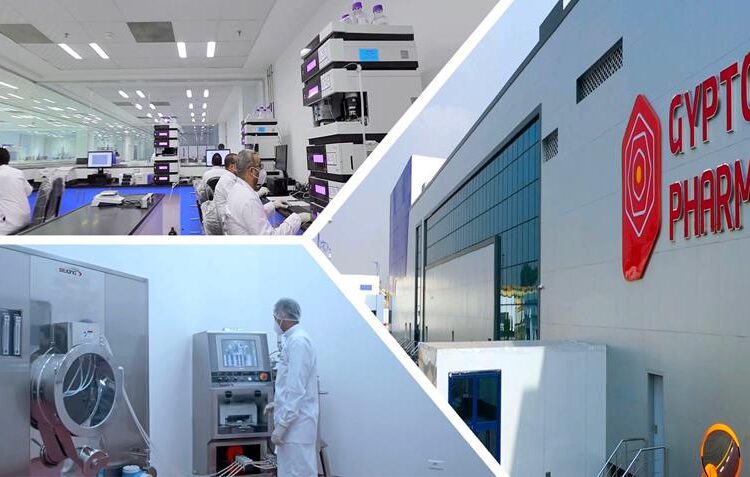Egypt has intensified its efforts to localise the medicine industry on the road to becoming a regional medicine production hub.
This issue, Egyptian officials say, is strongly connected with national security.
It is also a top priority in the light of the health emergency caused by the Covid-19 pandemic.
Egypt worked to get the latest global manufacturing technologies and the necessary ingredients for the production of medicines, exploiting co-operation opportunities with outstanding international companies in this regard.
It aspires to achieve integration in the pharmaceutical industry and attract more investments to reduce dependence on imports and meet the needs of the domestic market by utilising the capabilities of local manufacturers.
The government also worked hard to sharpen the competitive edge of locally-produced pharmaceuticals and open new export markets.
Egypt is one of the earliest countries to produce Molnupiravir, an antiviral medication that inhibits the replication of certain RNA viruses.
It was the Middle East’s first country to issue an emergency registration licence for this medication. Over 14 local companies obtained the licence on January 24, 2022.

Around 240,000 packages of this medication are produced here every year. Local companies also have enough raw materials for the production of additional 450,000 packages, according a recent report by the Egyptian cabinet.
Molnupiravir is the first oral drug for adults who are at high risk of Covid-19 infection. It reduces the risk of death and hospitalisation by almost the half for patients with mild to moderate symptoms.
It is only used inside hospitals to ensure its use is under full medical supervision.
Those suffering these symptoms take four capsules of the medication every 12 hours for five days.
Egypt produces around 75% of its medicine needs, the cabinet said in its report.
It produces 100% of its hepatitis C medicines, which contributes to bringing the price of the individual course down to $50, whereas the same course sells in other countries for $10,000, the cabinet said.
Egypt also produces around 79% of the antibiotics it consumes every year. This saves up to $70 million annually, an amount of money that used to go to imports in the past.
Egypt also produces 95.5% of single-dose eye drops, which saves the national treasury around $50 million annually.
The government works hard, meanwhile, to create a modern pharmaceutical manufacturing infrastructure, which is credited for raising the number of local medicine factories to 170 in 2022, compared to 130 in 2015.
The number of local medicine production lines rose this year to 700, compared to 500 in 2015, the cabinet said.
This increase was partly caused by a January 2022 decision by the government to exempt medicine production inputs from the value-added tax.
Gypto Pharma, Egypt’s mega medicine production city, is one of the largest in the region. The first and second phases of the city are constructed on 180,000 square metres.
The city produces between 250 million and 300 million packages of medicine every year. It manufactures 40 products.
The government hopes the city can export between 15% and 20% of its production in the coming period, the cabinet said in its report.
The city aspires to offer Egyptians high-quality medicines at appropriate prices, achieve medicine security, and do away with monopolistic practices.
It also aspires to become a regional centre for the medicine industry that attracts international companies and open export markets in Africa and the Middle East.
Six strategic medicine warehouses were also established in the past period at a cost of LE4 billion (roughly $213.9 million). The warehouses have a combined capacity of 190,000 pallets.
The warehouses aim to contain a strategic stock of medicines for between two and four months.
The Drug Authority initiative was launched in February 2021 to support and monitor Egyptian medicine exports and raise their competitiveness in the international market.
In 2021, Egyptian medicine exports amounted to $691 million, up from $537 million in 2016, the cabinet said in its report.

Egyptian medicine sales reached LE149 billion (around $7.9 billion) in 2021, up from LE62 billion (about $3.3 billion) in 2015, it added.
According to the World Health Organisation (WHO), Covid-19 has shown great inequality in the distribution of vaccines.
A vaccine technology transfer centre was established in South Africa to improve the availability of vaccines for all.
WHO referred to progress made by Egypt to benefit from the centre.
It congratulated Egypt on its selection as one of the first six countries to receive (mRNA) vaccine production technology, expressing aspiration to continue working with Cairo to support its vital role in promoting health security and equity for all.
It also indicated that the Egyptian Drug Authority has reached WHO-GBT Maturity Level 3 to regulate local and imported vaccines.
Egypt is the first country in the Middle East to receive WHO accreditation in the field of vaccines, helping it to make many gains, including by qualifying it to be a reference country that can be relied upon in global drug oversight.






Discussion about this post